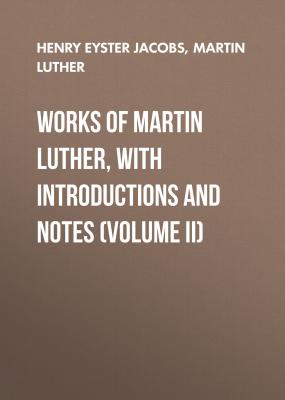Works of Martin Luther, with Introductions and Notes (Volume II). Martin Luther
Чтение книги онлайн.
Читать онлайн книгу Works of Martin Luther, with Introductions and Notes (Volume II) - Martin Luther страница 32
 case of abbacies. At the Diet of Worms (1521), Duke George of Saxony, an outspoken opponent of Luther, was as emphatic in his protest against this practice as Luther himself (Wrede,
case of abbacies. At the Diet of Worms (1521), Duke George of Saxony, an outspoken opponent of Luther, was as emphatic in his protest against this practice as Luther himself (Wrede, 168
A monk who deserted his monastery was known as an "apostate."
169
i. e., Offices which cannot be united in the hands of one man. See e. g., note 3, p. 91.
170
A gloss is a note explanatory of a word or passage of doubtful meaning. The glosses are the earliest form of commentary on the Bible. The glosses of the canon law are the more or less authoritative comments of the teachers, and date from the time when the study of the canon law became a part of the theological curriculum. Their aim is chiefly to show how the law applies to practical cases which may arise. The so-called
171
The thing which was bought was, of course, the dispensation, or permission to avail oneself of the gloss.
172
173
See above, p. 88, note 2. For a catalogue of papal appointments bestowed upon two "courtesans," Johannes Zink und Johannes Ingenwinkel, see Schulte,
174
See above, p. 87, note 1.
175
So Albrecht of Mainz bore the title of "administrator" of Halberstadt.
176
The name of this practice was "regression" (
177
The complaint was made at Worms (1521) that it was impossible for a German to secure a clear title to a benefice at Rome unless he applied for it in the name of an Italian, to whom he was obliged to pay a percentage of the income, a yearly pension, for a fixed sum of money for the use of his name (Wrede,
178
179
The
180
For a similar instance quoted at Worms (1521), see Wrede,
181
The three chief centers of foreign commerce in the XV and the early XVI Century. The annual fairs (
182
Built by Innocent VIII (1454-1490).
183
See above, p. 93, note 2.
184
The Church law forbade the taking of interest on loans of money.
185
During the Middle Ages all questions touching marriage and divorce, including, therefore, the question of the legitimacy of children, were governed by the laws of the Church, on the theory that marriage was a sacrament.
186
i. e., By buying dispensations.
187
The sums paid or special dispensations were so called.
188
The toll which the "robber-barons" of the Rhine levied upon merchants passing through their domains.
189
190
The Fuggers of Augsburg were the greatest of the German capitalists in the XVI Century. They were international bankers, "the Rothschilds of the XVI Century." Their control of large capital enabled them to advance large sums of money to the territorial rulers, who were in a chronic state of need. In return for these favors they received monopolistic concessions by which their capital was further increased. The spiritual, as well as the temporal lords, availed themselves regularly of the services of this accommodating firm. They were the pope's financial representatives in Germany. On their connection with the indulgence against which Luther protested, see Vol. I, p. 21; on their relations with the papacy, see Schulte,
191
Certificates entitling the holder to choose his own confessor and authorizing the confessor to absolve him from certain classes of "reserved" sins; referred to in the XCV Theses as
192
Certificates granting their possessor permission to eat milk, eggs, butter and cheese on fast days.
193
The word is used here in the broad sense, and means dispensations of all sorts, including those just mentioned, relating to penance.
194
Equivalent to "carrying coals to Newcastle."
195
The
196
A part of the Vatican palace notorious as the banqueting-hall of Alexander VI (1402-1503), turned by Julius II (1503-1513) into a museum for the housing of his wonderful and expensive collection of ancient works of art. Luther is hinting that the indulgence money has been spent on these objects rather than on the maintenance of the Church. Cf. Clemen, I, 384, note 15.
197
i. e., The offices and positions in Rome which were for sale. See Benrath, p. 88, note 18; p. 95, note 36.
198
See above, p. 84, note 1.
199
The passage is chapter 31,
200
See above, pp. 91 f.